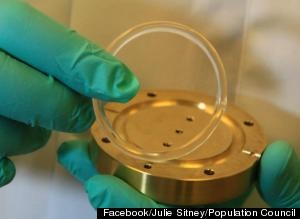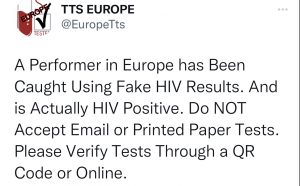An intravaginal ring laced with an anti-HIV drug could prevent the transmission of the AIDS virus during sex, a new study in animals suggests.
The study, published Wednesday in the journal Science Translational Medicine, showed that macaque monkeys that were fitted with vaginal rings containing the anti-HIV drug MIV-150 were far less likely to be infected when they were injected with a version of the AIDS virus compared to monkeys who received a placebo ring.
Researchers say the “findings suggest that drug-containing vaginal rings have the potential to prevent HIV infection, as well as other sexually transmitted diseases, such as herpes and human papillomavirus (HPV) infections,” NBC News reports.
According to the study, past research has suggested that vaginal microbicides may prevent HIV and sexually transmitted infections in women. However, determining the best method of delivery has remained a major challenge.
Previous studies with vaginal microbicides to block HIV have produced mixed results, with at least one showing some protection and another showing none. Those studies have been based on gels containing the drugs and have shared some limitations — particularly patient compliance.
Some women have seemed unwilling or unable to apply the gels long enough before intercourse for them to be effective. Researchers speculate that an intravaginal ring would eliminate that problem by being implanted for periods of at least three months, perhaps longer. That would provide the first true protection for women who have no other means of defense against the virus.
Zydowsky and his team found that the MIV-150 intravaginal rings “significantly protected” the macaques from a version of the AIDS virus.
MIV-150 is said to interfere with an enzyme that the virus needs to replicate.
For the study, researchers inserted the MIV-150 intravaginal rings into 17 macaques and placebo rings into another 16, before exposing the monkeys to a single dose of SHIV (a virus containing genes from HIV and SIV, its primate equivalent).
Among the monkeys that received the MIV-150 vaginal ring, two out of 17 became infected with the virus, while 11 of the 16 placebo monkeys became infected.
Overall, NBC notes, “the vaginal ring was 83 percent effective at preventing SHIV infection compared to the placebo.”
This study, however, is just a “first step” in the development of an anti-HIV vaginal ring for humans.
Though women have many options when it comes to contraception, there are currently only two for preventing HIV.
Women can wear a female condom, or for they can take a daily pill that was just approved by the FDA for partial protection, NPR notes.
Male condoms are also very effective at preventing the transmission of the AIDS virus when used properly, but “getting a man to use a condom isn’t always in a woman’s control,” Zydowsky told NBC.
“The idea is to give people choices,” said Zydowsky of the vaginal rings.
Source Huffington Post






